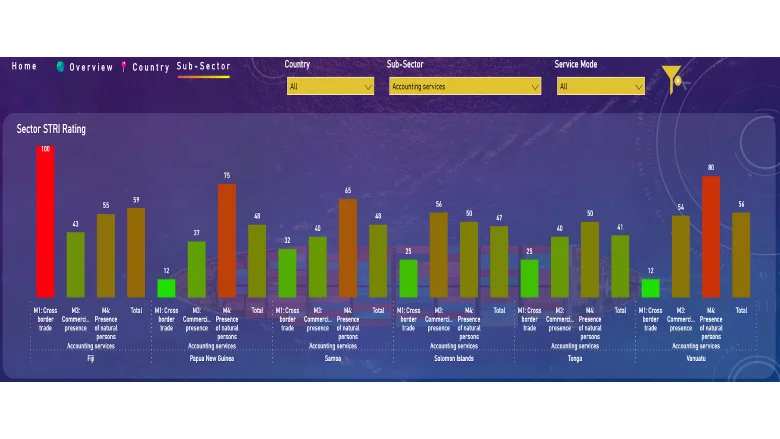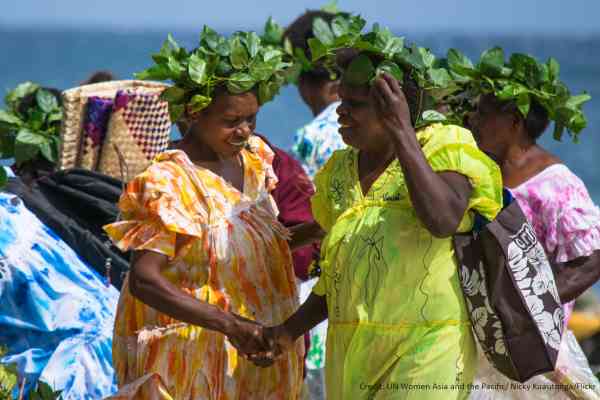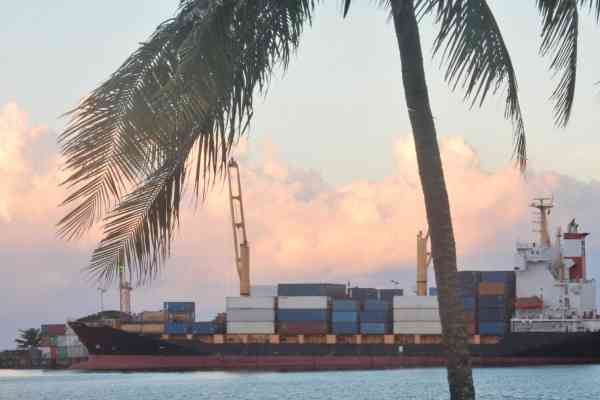Ce contenu a été initialement publié sur le site de la Banque mondiale.
(contenu disponible en anglais uniquement)
New Insights into Trade in Services in the Pacific
The World Bank and the Pacific Community (SPC) have created a new dashboard to document the restrictions in services trade across Fiji, Papua New Guinea, Samoa, Solomon Islands, Tonga and Vanuatu.

What is ‘trade in services’ and why is it important?
International trade in services, such as tourism and shipping, plays a vital role in driving economic growth in the Pacific. Currently, the service sector makes up about 60 percent of all exports in the Pacific, and services exports play an important role in foreign exchange earnings. However, the importing of services is equally important for growth in a region that is isolated from more established service-based economies.
Increasing service imports can reduce the cost of value-added services and promote growth, creating a positive ripple effect across an economy. However, many countries across the world have various regulatory restrictions, such as licensing requirements and limitations on foreign investments. These restrictions can create barriers to trade in services and slow economic growth.
Unlike tariffs on physical goods, which are easy to identify, barriers in the service sector often hide within other laws and regulations, making them difficult to pinpoint. These obstacles need to be identified and mapped so they are better understood. Governments can then consider addressing them to unlock their full potential and drive more sustainable growth in the Pacific.
What we’re doing
The World Bank and the WTO have recently completed an audit of service sector regulations for six Pacific Island Countries - Fiji, Papua New Guinea, Samoa, Solomon Islands, Tonga, and Vanuatu
The regulatory audit, part of a wider global audit of 129 economies, was conducted by local law firms and focused on regulations that discriminate against foreign service providers.
The audit information is provided in the Services Trade Policy Database (STPD), which organizes restrictive/discriminatory measures in four broad categories.
This information is then collated into the Services Trade Restrictions Index (STRI). The information on regulations is then scored according to restrictiveness and finally aggregated into indices. This allows for the creation of a scale of a country’s restrictions ranging from 0 (fully open and deregulated) to 100 (completely closed to foreign participation). The results of the audit and the STRI have been published on the global I-TIP Services Trade Policy Database and an explanatory presentation is available online.
How to make sense of it all?
The World Bank has partnered with the PACER Plus Implementation Unit and the Pacific Community (SPC) to take the STRI data to a broader audience. A dashboard of the data puts the information into an accessible and easy to understand format for partners and businesses across the six Pacific Island Countries. Users can compare countries and sectors or desegregate data quickly and easily. The tool allows benchmarking of countries against each other, which can help inform areas for improvement.

Publishing this data is the first step to improve awareness and understanding of the trade in services agenda across the region but the results are already useful for:
- The Private Sector who can use the database to better understand the business environment to inform their investment decisions;
- Researchers who can use the index data to model the effects of trade restrictions on economic outcomes;
- Policy makers who can use the audit and STRI to benchmark their country’s performance, to prioritize domestic reforms, and to inform negotiations with trade partners.
While more work is needed to better understand the implications of restrictions on trade, growth, and poverty reduction, the availability of this data presents a first insight into the business environment for services trade across the Pacific.
For more information, visit the STRI Dashboard and the Services Trade Policy Database.


